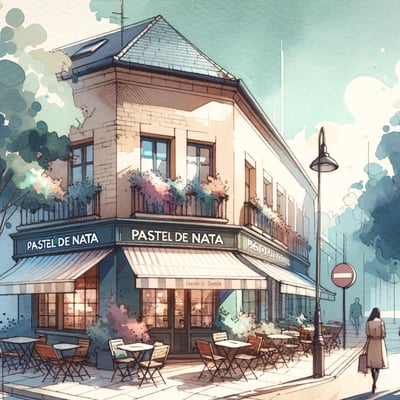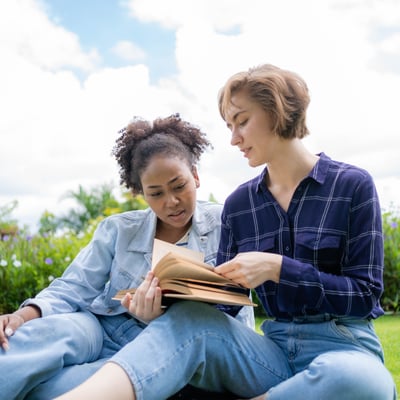We've unlocked the Premium Features for this special episode! Members get access to features just like this across our entire library. Learn More
Please request our permission before redistributing these files.
- Diogo: Amanhã vou ver um concerto de rock. Diogo: Tomorrow I'm going to see a rock concert.
- Uma amiga tem bilhetes para oferecer. A friend has tickets to offer.
- Queres vir? Do you want to come?
- Marco: Hmm… Eu vou trabalhar no sábado de manhã. Marco: Hmm… I'm going to work on Saturday morning.
- Qual é a banda? Which band is it?
- E a que horas vai acabar o concerto? And at what time will the concert end?
- Diogo: Não conheço a banda, são novos, mas a minha amiga Diogo: I don't know the band, they're new, but my friend
- diz que são bons e vão ser muito famosos um dia. says they're good and will be famous one day.
- As portas vão abrir às dezanove The doors will open at 7:00pm [19:00]
- e a banda vai subir ao palco às oito e meia. and the band will come onstage at 8:30pm [20:30].
- Não sei quando vai acabar. I don't know when it will end.
- Marco: Pois, deve acabar tarde. Marco: Well, it should end late.
- Se for, não vou dormir muito… If I go, I won't sleep much...
- Diogo: Oh, então vou ficar sozinho lá? Diogo: Oh, so I'm going to be alone there?
- Marco: A tua amiga não vai ver? Marco: Isn't your friend going?
- Diogo: Ela vai viajar, não pode. Diogo: She's going to travel, she can't.
- O avião dela vai partir à hora do concerto. Her plane is leaving at the time of the concert.
- Marco: Pois, mas não vai dar para mim. Marco: Yeah, but it won't work for me.
- Mas vai, vais divertir-te. But go, you'll have fun.
- Podes conhecer pessoas no concerto. You can meet people at the concert.
- Obrigado pelo convite! Thanks for the invitation!
- Diogo: Claro, de nada! Diogo: Of course, you're welcome!
Vocabulary
abrirto open acabarto end, finish amanhãtomorrow o aviãoairplane a bandaband o bilheteticket o concertoconcert conhecerto know be acquainted with, get to know, meet, experience divertir-seto have fun, to enjoy oneself dormirto sleep a manhãmorning a músicamusic oferecerto offer, give ouvidosears o palcostage partirto leave, depart, break sozinhoalone sing.,masc. sábadoSaturday trabalharto work viajarto travel Expressions
Queres vir?Do yousing.,inf. want to come? Obrigado pelo convite!Thanks for the invitation! Não vai dar para mimIt won't work for me 
 Joseph
Joseph Rui
Rui










I like so much your work!!! Will subscribe immediately after Christmas holidays!! My Portuguese fiance cannot be happier seeing me learning Portuguese so fast by following you!! Great work!!!
Thanks a lot, Lilika! It’s great to see your enthusiasm 😀
Hi there, I spend quite a lot of time in Portugal and want to retire there in 6 years. Have looked for good online courses, but most are Brazilian, as we know! Just found your website!
I am a language teacher myself, originally from Sweden, but now live in Switzerland. Your website looks great and I will definitely sign up for your course in a couple of minutes!
So excited!
Cheers,
Katarina
Thanks so much for your support, Katarina! 🙂
I listened to the sample coversation. Do you also provide full translation? The vocabulary helped but not quite enough to understand everything.
Also Portuguese people seem to speak faster than this. Do you know if this is the speed used in language exams (A2 level)?
Thanks for trying it out! Yes, the full translation is included as part of our membership. We have hundreds of these that can be sorted by difficulty level and topic. You can read more about what’s included here: Membership Benefits or sign up here: Become a Member . As for the speed used in the A2 exam, I’m not sure, but hopefully another user who sees this will know.
Good!
I appreciate that I was able to slow down the conversation so I could read along as they spoke, and then read again with the translation!
I’ve been doing this course for about 2 weeks now and I’m very happy with it. I’ve been exposed to Brazilian Portuguese since my wife is Brazilian, but European Portuguese is a lot more difficult. The Portuguese like to “swallow” the endings, just like the Bavarians do in Germany. Your course reminds me of Rosetta Stone, only it’s better, because you provide explanations and grammar. So, good job, guys! I think, I’ll be speaking a pretty good Portuguese in about 6 months thanks to you.
Hi ! I have a question regarding the use of gerúndio in: “comprando numa das bilheteiras oficiais”. Would it be possible to rewrite the sentence together with the question above it to read as follows: “comprando numa das bilheteiras oficias, o Diogo conseguiu billets para o concerto” ?. I am trying to connect the use of gerúndio here with what Cunha / Cintra says on page 613 in Nova Gramática do Português Contemporâneo: “Colocado no início do periodo, o GERÚNDIO exprime: a) uma ação realizada imidiamente antes da indicada na oração principal.”
Am I on the right track here or should I be looking at another grammatical rule?
Olá, Tommy. The rewritten sentence is correct 🙂
I took your advice and tackled this conversation a bit at a time, replaying and replaying each snippet trying to understand what was being said, writing down what I thought I heard. It took two hours but I got through the whole thing. There were a few times I couldn’t figure out a word or two (for example hora sounds like orda to me because of how the r is pronounced in Portuguese), but the trickiest expression was “Podes conhecer pessoas no concerto.” I heard “Pode blah blah concerto”, and even after listening multiple times I couldn’t make any sense of the middle section. When I looked at the Transcription and saw what it was, even then I had a difficult time to match the spoken voice to the text. Overall though I was pleased with my efforts and will try it again in the next lesson.
Hello Peter,
An advice to learn languages. try to use portuguese words at you day life, listen some podcasts en watch news in Portuguese like the Channel on Youtube ‘Euronews em português’.
And of course, do some face-to-face with portuguese.
Keep the good work !
Thanks Tony. I’m currently living in Northern California and there is definitely no one here to do face-to-face practice with. We hope to move to Portugal sometime in the next few months and will gets lots of practice once we land of course. There are still lots of Shorties I haven’t done yet in the Practice Portuguese content so that’s my next plan of attack.
I like your motivation Peter !
Did you try to find someone to exchange over Internet ?
I’m am currently searching to do exchange in Portuguese/English.
Maybe the admin of the website can give you my email if you ask them.
Here’s a link to our member’s forum if either of you wanted to find study partners 🙂 : https://forum.practiceportuguese.com/c/cafc3a9/study-groups-meet-ups/27
Could you please explain se for ( if I go ) not se vou ?
“For” is a future subjunctive form. It fits well at that point in the dialogue, since he’s talking about a hypothetical situation in the future (the subjunctive mood is often linked to hypothetical scenarios, among others) 🙂
Sorry I am jumping around between A1 and A2 activities, so my question might be because I haven’t gone step by step.
Diogo: Não conheço a banda, são novos, mas a minha amiga
diz que são bons e vão ser muito famosos um dia.
Why is it a Banda (singular and feminine) but são Novo’s and são bons ( both plural and masculine)?
Thanks. Really loving the combination of learning tools on your website
Olá Joanne!
When informally speaking it’s common to refer to the band as the group of people. So, even though Diogo says “a banda” (“the band” sing. fem.), he carries on referring to the people that make up the band: they (pl. masc.). Grammatically he should have been coherent and said “Não conheço a banda, é nova, mas a minha amiga diz que é boa e vai ser muito famosa um dia”. However, he decided to refer to the people in the band, which is very common!
Let me know if you have any other questions.
Cheers,
Luís
Great explanation. Obrigado
Obrigada Luís. A nice clear explanation, we’d probably do a similar thing in English, – I am going to see a new band, they are great and will be famous one day,but our adjectives don’t have to match
Exactly! 🙂
Thank you, Joanne!
I have been practicing Portuguese for 2 years now and with a tutor from Portugal also. Practice Portuguese isn’t that cheapest and neither is a tutor but if you are serious about European Portuguese then options are limited but good or the best options are down to this app. I recommend using it daily and two classes per day. Maybe more to start but once you get going two will keep you from getting burned out. Use all the tools and don’t give up. After two years without living in a Portuguese environment it’s been hard but I am able to listen and understand basic to intermediate Portuguese and speak enough to function somewhat. I am 62 this year and old dogs can learn new tricks. I am hoping to migrate to Porto in a couple years and I want to do my part to be a good citizen and speak the language.